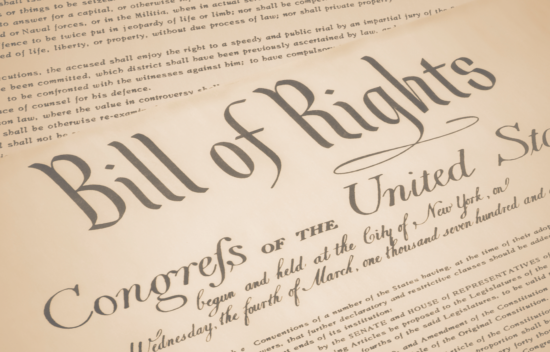
John Adams and the Alien and Sedition Acts
Guiding Question:
- Was the sedition portion of the 1798 Alien and Sedition Acts, signed into law by President John Adams, a constitutional war measure?
Objectives:
Students will:
- Understand John Adams’ reasons for believing the Alien and Sedition Acts to be a constitutional war measure.
- Analyze arguments for and against the constitutionality of the Alien and Sedition Act.
- Assess the constitutionality of the Alien and Sedition Acts.
- Handout A: John Adams and the Alien and Sedition Acts
- Handout B: Dinner Party Guests
- Handout C: Dinner Conversation
To create a context for this lesson, students complete Constitutional Connection: War and the Constitution.
Have students read Handout A: John Adams and the Alien and Sedition Acts and answer the questions.
Show the five-minute thematic documentary Commander in Chief: War and the Constitution, found at www.youtube.com/watch?v=UdLSZ-3AR6k.
Give students one card each from Handout B: Dinner Party Guests. Give students a few moments to become familiar with the information on their card.
Have students form groups made up of six different individuals. They should stand, introduce themselves, remain standing and “mingle” as though at a dinner party.
After dinner party guests have had a chance to mingle, distribute Handout C: Dinner Party Conversation.
Before “dinner” begins, have students sit down and write down five questions (one question each for the other people at the table) on Handout C. Encourage students to use not only the information on their dinner party card, but also their own knowledge as well as information from Handout A.
Allow “dinner” conversation to proceed, with students asking questions of each other and responding.
With about ten minutes left for “dinner,” have students write down the most important question they received, and explain their response on Handout C.
To wrap up “dinner,” all guests should prepare to make a “toast” (or a “roast”) to President John Adams. Toasts should include Adam’s accomplishments and the guests’ opinions about them. Encourage students to use irony or humor. For example, a guest who supported the Alien and Sedition Acts might say: “To my good friend John, who kept us out of war, and kept us civilized.” A guest who condemned the Acts might say: “To His Majesty Adams, who could wait barely a year in office before trampling upon our most sacred rights.”
Have students share their toasts/roasts.
Have students write two or three paragraphs in response to the following prompt: Why does history seem to blame the President—who is not a lawmaker— for bad laws?
While the Virginia and Kentucky Resolutions condemned the Alien and Sedition Acts, ten of the fourteen states responded to those resolutions by issuing proclamations that condemned state interference with federal law, and, in some cases asserting, the constitutionality of the Alien and Sedition Acts. Have students read the Virginia and Kentucky Resolutions as well as the responses of Rhode Island and New Hampshire in response to the Virginia and Kentucky Resolutions. How do the arguments compare and contrast? The documents can be found at: https://bit.ly/vakyresolutions and responses can be found at: oll.libertyfund.org/pages/1798-counter-resolutions-of-other-states
Have students write a two to three page essay in response to the following prompt: One historian describes a “rampant fear of the enemy within” during the time the Alien and Sedition Acts were passed. Has this description applied at other times in US history? Does it apply today? Explain.



